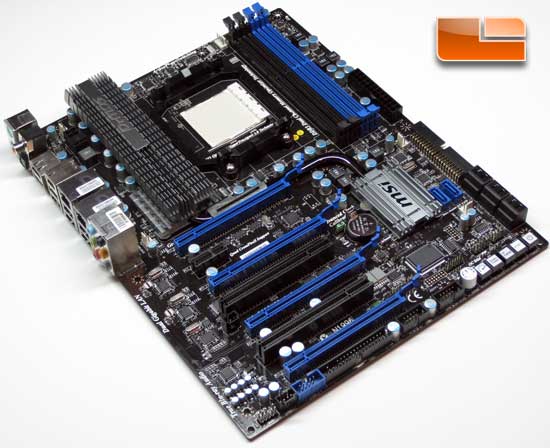MSI 790FX-GD70 Socket AM3 Motherboard Review
Introduction and Specs

SPECIFICATIONS
CPU
| Supports 64-bit AMD Phenom II X4 / Phenom X3 processor (Socket AM3) | |
| Supports AMD CPU with 140W power requirement | |
| For latest information on CPU support list, please check http://www.msi.com/index.php?func=cpuform2 for more detail |
Chipset
|
AMD 790FX (AMD RD790) Chipset |
|
|
– |
HyperTransport connection to AMD Phenom/Athlon processor |
|
– |
HyperTransport supporting speed up to 2.6GHz (5200mt/s) |
|
– |
Supports 4 PCI-E x 16, & 1 PCI-E X 1 |
|
ATI SB750 Chipset |
|
|
– |
Supports SATAII controllers for six drives |
|
– |
Supports single channel Ultra DMA 100/133 master mode EIDE controller |
|
– |
Supports Hi-Speed (USB2.0) controller 480 mb/s transfer rate up to 11 ports |
Main Memory
|
Supports four unbuffered DIMM of 1.5 Volt DDR3 800/1066/1333/1600*/1800*/2133* (OC) SDRAM, 16GB Max |
|
| Due to the High Performance Memory design, motherboards or system configurations may or may not operate smoothly at the JEDEC (Joint Electron Device Engineering Council) standard settings (BIOS Default on the motherboard) such as DDR3 voltage, memory speeds and memory timing. Please confirm and adjust your memory setting in the BIOS accordingly for better system stability. | |
Slots
|
Four PCI Express X16 slots , support ATI CrossFire Technology (PCI Express Bus Specification v2.0 compliant) |
|
|
One PCI Express X1 slot |
|
|
Two 32-bit PCI slots (3.3v/5v PCI Bus Master slots) |
On-Board IDE / SATA
|
An IDE controller on the ATI SB750 chipset provides IDE HDD/CD-ROM with PIO, Bus Master and Ultra DMA133/100 operation modes. |
|
|
– |
Can connect up to 2 IDE devices |
|
SB750 supports 6 SATA II ports (SATA1-6). Transfer rate is up to 300MB/s. |
|
|
– |
Supports up to 6 SATA |
|
– |
RAID 0 or 1, 0+1, 5 is supported |
|
– |
RAID function work w/ SATA/SATAII HDDs |
|
JMicron JMB322 controller supports 2 SATAII (SATA7/8) & eSATA port |
|
|
– |
RAID 0, 1, is supported |
|
– |
RAID function work with SATA/SATAII HDDs |
BIOS
|
The mainboard BIOS provides “Plug & Play” BIOS which detects the peripheral devices and expansion cards of the board automatically. |
|
|
The mainboard provides a Desktop Management Interface (DMI) function which records your mainboard specifications. |
|
|
Supports boot from LAN, USB Device 1.1 & 2.0 and SATA HDD |
Audio
| 8 Channel software audio codec Realtek ALC889 | |
| True Blu-ray Audio Support | |
|
Compliance with Azalia v1.0 spec. |
|
|
Flexible 8-channel audio with jack sensing |
LAN
|
Dual Realtek 8111DL Gb LAN chip |
|
|
– |
Supports 10Mb/s, 100Mb/s and 1000Mb/s |
|
– |
Compliance with PCI-Express v1.0a |
IEEE1394
|
VIA VT6315N controller |
|
|
Support up to 2 IEEE 1394 ports (rear x 1 / front x 1) |
|
|
Transfer rate up to 400 mbps. |
On-Board Peripherals
|
– |
1 floppy port supports 1 FDD with 360K, 720K, 1.2M, 1.44M and 2.88Mbytes |
|
– |
1 serial port (supported by pin-out) |
|
– |
1 audio jack (6-in-1), coaxial/fibre SPDIF out |
|
– |
11 USB 2.0 ports (Rear x 7 / Front x 4) |
|
– |
2 RJ45 LAN jack |
|
– |
1 eSATA/USB share port |
|
– |
2 IEEE 1394 a connectors (Rear x 1/ Front x 1) |
|
– |
1 CD-in pinheader |
Dimension
12 in (L) x 9.75 in (W) ATX Form Factor
Let’s move along and look at the layout of the board.

Comments are closed.